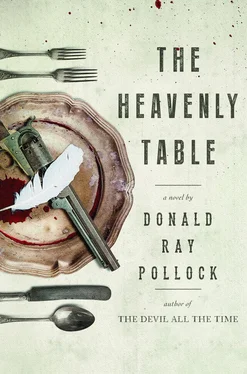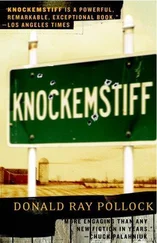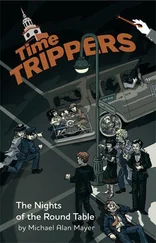“You mean General Custer, don’t you?” Crank said.
“Shit, what difference does it make?” Ballard replied. “He’s a prick, that’s what I’m saying.”
Ellsworth stood waiting for a long time in the hot sun. The guards ignored him and he studied their brown uniforms and campaign hats out of the corner of his eye, trying to picture Eddie wearing one. He overheard Ballard tell a joke about a queer who set up house in a cucumber patch, but he couldn’t make heads or tails out of it. He wondered if either of them knew where Germany was located.
When Zimmerman finally returned, his spine was even straighter than before. Unfortunately, in the time it took him to reach the office where the records were kept, he had allowed his mind to drift for a minute or two, first daydreaming about his next promotion and then worrying about what Ballard and Crank were saying behind his back, and he had forgotten the name the farmer had given him. “Who are you looking for?” the private behind the desk asked. Zimmerman had shut his eyes for a moment and strained his memory. The last name started with an “F,” of that he was sure. “Franklin,” he guessed. The private scrolled through several pages, then said, “Don’t see any Franklin, but we got a Wesley Franks signed in two days ago.” “That’s him,” Zimmerman said, and out the door he went.
“Well, you were right,” he told Ellsworth. “They got a new one on the list goes by that name.”
“Good,” the farmer said. “How do I get him back?”
“You can’t,” Zimmerman said, shaking his head. “He’s already been inducted.”
“But he’s only sixteen years old. That’s too young to be fightin’ the Germans, ain’t it?”
“Too young!” Ballard spoke up. “Ain’t you heard? Them Huns got newborn babies chained to machine guns. They either fight or get dumped in the stew pot with the horse apples. Don’t worry, your boy’s plenty old enough.”
“Good God, Ballard,” Zimmerman said, “you’ve been talkin’ to Sergeant Malone again.” The sergeant he referred to was a great spinner of horrific war stories, and much admired among some of the new recruits at Camp Pritchard. As a youth, he had fought in Cuba in 1898, and then, ever nostalgic for what he considered the “best three weeks of his life,” had quit his job in a glove factory in upstate New York and joined up with the Red Cross in the summer of 1915, it being the only way an American could get to the war at that time. Although he soon found out that the conflict in Europe was no horsey lark in the tropical boonies, to his credit he endured eighteen months of hell with an ambulance crew around Verdun before he began to go haywire and ended up in a loony bin down near Marseille. Despite his protestations, he was judged unfit for further service and sent home just a few weeks before the United States entered the fray. By then he was twitchy and gray and thirty-eight years old, a mere shell of the boy who once rode with Roosevelt, and though he didn’t think they would take him, he showed up at the recruiting station in Albany anyway. To his surprise, because of his experience at the Front, the whiskey on his breath had been ignored and he’d quickly been offered a sergeant’s rank. Now he was training doughboys how to take a shit in the mud without getting their heads blown off, and practicing a self-prescribed form of controlled drinking that kept him from diving to the ground every time a bird flew over.
“So? I guarantee you Malone knows more about what’s goin’ on over there than your Lieutenant Bovard ever will.”
“He’s a bad one to drink, my boy is,” Ellsworth interrupted. It was embarrassing to admit, but what did it matter? He would never see these men again anyway. “And dumb, too,” he added, figuring he might as well lay it on as thick as possible. “You don’t want to be a-fightin’ along someone like that, do you? Hell, he’s as liable to shoot the wrong man as the right one. Believe me, fellers, he ain’t fit to be in your army.”
“Mister,” Crank said, “if being stupid kept men out of the army, there wouldn’t be enough left in Camp Pritchard to wash the dishes in the chow hall.”
“Don’t listen to the bookkeeper,” Ballard told the farmer. “He’s just pissed because—”
Throwing up his hands in frustration, Ellsworth said, “What if I talked to the boss?”
Both the privates laughed, but before either could make another smart remark, Corporal Zimmerman silenced them with an upraised hand. He had allowed this foolishness to go on too long and he needed to reinforce his authority. Turning to Ellsworth, he began speaking slowly, as if he were talking to someone who had just awoken from a long coma. Zimmerman had discovered, over the course of manning the gate eight hours a day for the past couple of weeks, that many people, soldiers and private citizens alike, have a hard time taking no for an answer. They’re like little children who have been spared the rod and trust that, by yowling long enough and loud enough, they will eventually get their way. He was convinced that any parent who didn’t beat their offspring within an inch of their lives at least once a week was doing the world a great disservice, and he was thankful now that his own father had followed that line of thinking. Sure, it might have hurt at the time, but if it hadn’t been for his old man’s leather strap, Zimmerman thought, he might have turned out like that sniveling whiner Crank, or, God forbid, that mouthy, fatheaded Ballard. “Now,” he told Ellsworth, as he finished explaining the situation in short declarative sentences that even a cretin might understand, “the best thing for you to do is go back home. Don’t worry, you’ll see your son in a year or two.” He held up one finger, then another, in front of the farmer’s face.
Ellsworth’s eyes widened. “A year or two!” he sputtered. Why, he couldn’t imagine it taking more than a few weeks to kill every human being on the planet if you had someone overseeing things who knew what they were doing. But then again, with the government in charge, it might go on forever without anything to show for it. There was no way he was going to get Eddie back. He realized that now. “What’s this war about anyway?” he asked.
The soldiers glanced at one another uneasily. In all their hours of manning the gate, and answering a thousand questions, nobody had ever asked them that one before. “It’s complicated,” Zimmerman said.
“What’s that mean?”
“Some bastard shot some other bastard,” Crank said. “Over around Russia somewhere.”
“That’s pretty much the crack of it, from what I hear,” Ballard chimed in.
“You mean the crux of it.”
“Actually,” Zimmerman said, “it started in Austria. I ought to know. I’ve still got family living there.”
“I’ll bet you do,” Ballard said snidely. “I’ll bet ol’ Australia’s full of your kind.”
Crank rolled his eyes. “He said Austria, not Australia.”
“Well, if that’s the reason they started this war, the politicians must be clear out of their minds,” Ellsworth said, raising his voice. “Either that, or they’re a-lyin’ to ye.”
The soldiers all stared silently at the farmer for a moment. Regardless of how they felt about each other, they all believed, deep down, that there was nothing nobler than being a courageous patriot defending his country against the savage Germanic hordes. Even Crank, as much as he missed his parents and French toast on Sunday mornings and his peaceful bedchamber overlooking the sugar maple in the backyard, would have agreed with that if push came to shove. “Sir, you could be arrested for that kind of talk,” Zimmerman finally said.
Читать дальше












